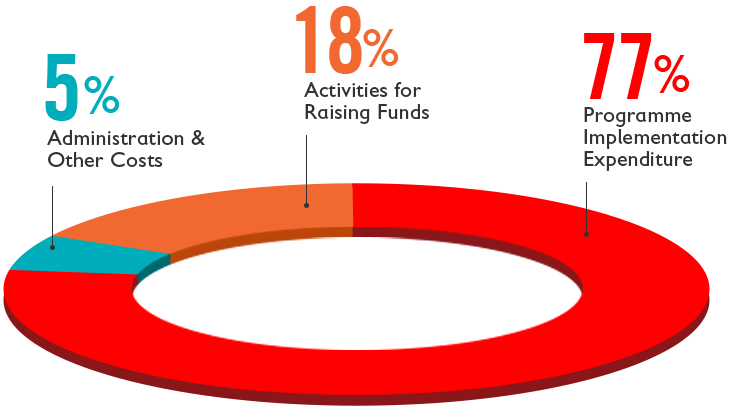Children in India continue to suffer due to issues like such as lack of healthcare, malnutrition, poor hygiene, illiteracy and exploitation.
- 11.27 lakh children below 5 die in a year. This is 3212 under 5 child deaths per day
- 1 in every 8 children in India is works as a child laborer
- More than half (56%) of the under 5 deaths occur within the first 28 days of life, we work to prevent these lives
- Almost 1 in 3 women in India are married before the age of 18
- 8.4 crores children in India don’t go to school
- 20% of grade 2 children in India cannot recognize numbers 1-9; 53% of children drop out of school at elementary level
- 49.5% of grade 5 children cannot do subtraction; 51.09% of grade 5 children cannot read grade 2 English and 25.4% children of grade 8 cannot read grade 2 text
- Almost 1 in 3 women in India are married before the age of 18
Children are perhaps the most “voiceless” segment of the population and it is up to us to recognize their issues and work together to address them.
What We Do to Address Children’s Problems
Bal Raksha Bharat has changed the lives of more than 1 crore Indian children since 2008. It is one of India’s biggest NGOs. Established in 1919, and present in more than 80 countries, we are one of the most influential, organised, well- networked, resourceful and impactful NGOs.
Bal Raksha Bharat works for providing equality, equal education, equal nutrition, equal health, equal opportunities, gender equality, and life-saving humanitarian situations and relief during natural disasters to the most deprived children of India.
Our core is our programmes, whether it is the remotest corners of the country or the most disaster-torn or dangerous areas or slums in metros, we do whatever it takes to help children shine in life.
Our work in the areas of Child Education, Health & Nutrition, Child Protection and Humanitarian Response & Disaster Risk Reduction has benefitted lakhs of children in India. Last year alone we reached 22.51 lakh children through our programmes.
How your support helps
Your small donation can save lives.
In order to plan and execute our projects, we are solely dependent on the support of our donors. Last year, the immense generosity of our 1.83 lakh donors helped us reach 22.51 lakh children out of which 9.01 lakh children received direct support in education/health & nutrition/were protected from evils like child marriage, abuse, labour.
Your small contribution will go a long way in changing a child’s life. It can do wonders for a child and give them a new start in life (in some cases life itself), whether it’s sending them to school or helping them fight killer malnutrition or leave behind a life of child labour.
While Bal Raksha Bharat appreciates monthly donations more where you choose to donate a small fixed amount monthly for us to be able to plan our programs for longer term, a single donation can also help save a child.
What You Get in Return of your Support
Our donors are at the heart of all our efforts of changing the lives of India’s children and we can never thank them enough for their support. When you donate to Bal Raksha Bharat you get:
- The unparalleled joy of changing a child’s life, which is yours forever.
- A Welcome Pack
- Regular updates of the difference we are able to make in children’s lives using the donations received.
- Tax exemption certificate (as per section 80G of the Income Tax of India act) for the amount you donate. 50% of the amount you donate is tax exempt (as long as the donation amount is less than 10% of your gross income)
Your donations
have changed lives.
A small amount can change the life of a child; through education, nutrition, and basic protection, children can lead normal lives. The adjacent graph is a representation of how we have utilised your donations.

IMPACT CREATED LAST YEAR
(Children reached in 2019)
SAVED
-
FARHEEN Helping Mothers and Children to Leave Malnutrition Behind
Akhtari Begum was all but 15 when she tied the knot with Mohammed Zakil. They went on to have four children – three daughters and one son. Two of her daughters were born in the hospital while Farheen, the youngest one, was delivered at home. Mohammad does not have a regular source of income; he collects plastic from garbage dumps and sells it while Akhtari cuts rubber strips for slippers and contributes to the family income. The family resides in a slum in Kolkata.
Akhtari underwent two ante-natal checkups when she was pregnant with Farheen. She had also taken one tetanus shot but that was all. Farheen was born at home and did not receive polio vaccinations on time.
Months went by but Fahreen couldn’t gain weight. Six months after her birth, our Community Facilitator (CF) Arpita Bhowmik met the mother and child. From the first look of her, Arpita determined that Fahreen was a case of Severe Acute Malnourishment (SAM). She conducted the Mid-Upper Arm Circumferece (MUAC) assessment for Fahreen whose results revealed that the baby was in the red zone as MUAC reading was 11.2 cm (normal = 13.5 cm). The baby weighed a mere 5.5 kg.
Later in July, the CF started bringing Akhtari to a Nutrition Counseling and Child Care Session (NCCS) organized by Bal Raksha Bharat in a local club. “My child ate the khichudi there. I tried to prepare it in the same way and fed her at home”, Akhtari shared.
Akhtari participated in three such sessions where she received extensive counselling on breastfeeding and preparing the right diet for Fahreen. Thereafter, the CF also took the mother-child duo to the government-operated Nutrition Rehabilitation Centre (NRC) where Farheen was once again assessed. To her mother’s relief, Farheen’s health status had improved and she was no longer a case of Severe Acute Malnourishment (SAM). She had moved to the Moderate Acute Malnourishment (MAM) category and still needed more help. The nutritionist at NRC gave instructions on dietary practices for Fahreen.
A month later, Farheen’s MUAC reading went up to 13.5 cm and her weight increased to 7.5 kg. Next month, MUAC reading surged by another 0.3 cm and Farheen entered into the green zone (normal MUAC). However, her weight increased by a mere 0.2 kg and this was still a cause of concern.
The CF is sure that in the next two months, Fahreen weight will also increase considerably and she’ll be able to bid adieu to malnutrition. She’ll continue lending the required support to the mother and child.
Our Community Health Workers and Facilitators are playing a hero’s role is battling malnutrition – one of the leading causes of high child mortality in India. Through your support, we can train many more such facilitators which directly means that we can save more lives. Come forward today. Every contribution is tax-exempted.
*Name and image of the child have been changed to ensure the safety. -
30000 THROUGH KGBV JHARKHAND PROJECT
Making Giant Strides in Educating the Girls of Rural Jharkhand
Menaka Das is one of the young girls of the Sonua village in the West Singhbhum district of Jharkhand who, until a few months ago, had no idea how a computer looked like. Forget computers, she didn’t even have electricity in her house. Today, she is a student of Kasturba Gandhi Balika Vidyalaya (KGBV) and can be seen excitedly arranging her files on a computer in her school which she can’t wait to show to her parents in the next Parents Teachers’ Meeting (PTM).
Menaka is a lucky girl. Unlike her, a large number of girls in the rural parts of Jharkhand are still deprived of even basic education let alone computer literacy. Jharkhand is one of those states in India where girl child education in villages is in shambles. The state witnesses a 54% school dropout rate and there’s a shortfall of as many as 64,000 teachers in government schools.
The community worker had an extensive discussion with the old lady that day but it was all in vain. The grandmother was a tough nut to crack and the community worker had to pay her several visits in the days to come in order to convince her to send Ganesh to the activity centre. Ultimately, the grandmother yielded and gave her go-ahead for sending the boy to the activity centre.
There are a number of reasons behind this pitiable condition of girl child education in the state. Due to economic constraints and far-off schools, many parents prefer their girls performing household chores or working in the crop fields to sending them to schools. With parents themselves being uneducated and orthodox, many girls end up becoming child brides mothers at a time when they should be giving their board exams. Infrastructure for child education is in a crippled state. Decent sanitation facilities are absent in a large number of government schools, yet another deterrent for parents to send children to schools.
Bal Raksha Bharat, funded by P&G’s Shiksha project, has been working to facilitate quality education for girls in at least six KGBVs and 14 other schools in Jharkhand to ensure their holistic development. A number of on-ground programs have been strategized and implemented to ensure that these girls get quality education and are also imparted training in extra-curricular activities. In this process, we have mapped out-of-school children, provided gender-sensitive material and have encouraged the use of school building as a tool for learning.
Working in some of the remotest villages of the state such as Buruhundru, Chanho, and Sonua, Bal Raksha Bharat has been able to reach out to 3810 children directly and over 30,000 children indirectly. The effort has been to bridge the gap between the School Management Committees (SMCs) and the people of the village so that the latter are encouraged to send their children, especially girls, to schools.
Working in some of the remotest villages of the state such as Buruhundru, Chanho, and Sonua, Bal Raksha Bharat has been able to reach out to 3810 children directly and over 30,000 children indirectly. The effort has been to bridge the gap between the School Management Committees (SMCs) and the people of the village so that the latter are encouraged to send their children, especially girls, to schools.
A gamut of success stories have come to the fore through this partnership. Within a short span of time, the program has started bearing sweet fruits. A number of rural girls have emerged as first generation learners in their families. Girls who were previously confined to their homes or crop fields are now learning about elements in the periodic table. They’re making models to be displayed at national level science exhibitions. Their joy knows no bounds when a seemingly inanimate alga becomes alive when viewed through the lens of a microscope.
These girls now realize that education is one tool which can help them to grow and aspire and leave behind the lives which their mothers and grandmothers were forced to live. Many of them can be seen reasoning with their parents, cajoling and assuring them about the importance of going to a school. There is an enormous appetite to learn and gain knowledge to make a mark in the world outside.
When you P&G products, a portion of the proceeds goes towards supporting our work in these schools. Bal Raksha Bharat welcomes and appreciates your support in its endeavour of providing comprehensive education to the marginalized rural girls. Donate today to light the lamp of education because good education is what every child deserves.
*Name and image of the child have been changed to ensure the safety. -
GANESH Enabling Children to Make the Transition from Street to School
Ganesh was barely five when he was sent out to beg on the streets. Living on the pavement near the Kalkaji Temple in South Delhi with his grandmother, he did nothing all day except begging. On the street, he was often at the receiving end of abuse – both verbal and physical. With the money he got, he could barely get two square meals a day. In the past, Ganesh had gone to school for maybe just a year after which he dropped out and took to streets. His father did not stay with them but came to meet them occasionally. When Ganesh was four, he lost his mother.
While conducting a survey, Bal Raksha Bharat’s community outreach worker came in contact with Ganesh. The boy wore shabby clothes and was begging with his grandmother. The community worker reasoned with his grandmother that Ganesh be sent to Ankuran – Bal Raksha Bharat’s activity centre in the Bluebells School in South Delhi. The grandmother plainly refused saying that earning money was more important than learning and went on to question the community worker that what will Ganesh achieve after getting education.
The community worker had an extensive discussion with the old lady that day but it was all in vain. The grandmother was a tough nut to crack and the community worker had to pay her several visits in the days to come in order to convince her to send Ganesh to the activity centre. Ultimately, the grandmother yielded and gave her go-ahead for sending the boy to the activity centre.
Once Ganesh started visiting the centre regularly, a world of opportunity was laid bare before him. Initially, he used to keep quiet and could barely interact with the people at the centre. He hesitated to participate in the sessions and often got distracted by other students. But with time things started changing and changing for good. Soon the centre head could discern some positive behavioural changes in Ganesh. He started learning willingly and sought eager participation in class activities. His interaction with other children at the centre and the staff started reaching a different level and he was no longer a child who barely opened his mouth.
Ganesh is now a happy, enthusiastic, and a bright child with an appetite to learn. His brother has also been enrolled in the Bluebells centre. The boy has a penchant for painting and has an artistic side of the personality to flaunt. There was a time when he could barely speak and now he has become a good articulator. “I like doing the art and craft activities which are conducted at the centre. I also like playing with other children. I feel happy to be here as no one uses abusive language while speaking to me, says Ganesh.
The biggest moment in the life of Ganesh came when he was given admission in class 2 in a nearby primary school run by Municipal Corporation of Delhi (MCD), a proud moment for Bal Raksha Bharat as well. We wish him all the best for future and hopes all his dreams come true.
Through an array of targeted programs, Bal Raksha Bharat is working for the transition of children from street to school. We need to reach out to many more children living on streets and we cannot do this without your support. With an amount as less as Rs. 800, you can help in shaping the future of a child living or working on streets.
*Name and image of the child have been changed to ensure the safety. -
No More Ragpicking: Muna Now Labours in School and Not on Streets
Muna’s day began with the chirping of birds. Every morning, he set out in the bylanes of Bhubaneshwar with a bag on his shoulder and no sir, that was not a school bag. The bag he carried was a ragpicking bag. Muna was a ragpicker fending for himself and contributing to the meagre family income by picking up junk. The lanes he worked in were shady which the city dwellers didn’t like to frequent. But little Muna hardly had any other options in life.
This was until Bal Raksha Bharat intervened. Upon learning about Muna’s life, we got him enrolled in the National Child Labour School, at Kargil Basti in Airport Area, Bhubaneswar, a special school meant to cater to street children and those working as child labourers.
A new phase in Muna’s life started there. An extremely vivacious and forthcoming boy, he started cementing friendships with other children right from his early days in the school. After a few days, Muna’s joy knew no bounds. Three other boys who used to go ragpicking with him – Raju, Ramesh, and Anil – joined him in the school. His two brothers followed suit. Muna now was a part of a close-knit family in the school and displayed his mettle in academics.
Together the four rag pickers made full use of the new lease of life in school. These boys, who were losing their childhood on the streets of Bhubaneshwar, started finding it meaningful. After studying for two years in the National Child Labour School, Muna left it for pursuing formal education.
He now studies in class 6 in Aerodrome Colony UGUP school. His teacher says that he’s one of the brightest students in the class. His father now drops him to school every day and Muna is loved by his classmates for his happy-go-lucky nature.
From being a ragpicker to school student, Muna has come a long way indeed. He’s a well-informed individual now and has a very positive attitude towards life. He wants to continue studying and get a nice job in future.
Not all children in India are as fortunate as Muna. All children, irrespective of their religion, social status and gender should get quality education. Bal Raksha Bharat runs a range of programmes focusing on mapping out-of-school-children , creating Inclusive and Learner Friendly Environments for children, supporting the establishment of right set of infrastructure in government schools along with a plethora of other activities. None of this would’ve been possible without the support from generous donors like you.
*Name and image of the child have been changed to ensure the safety.











